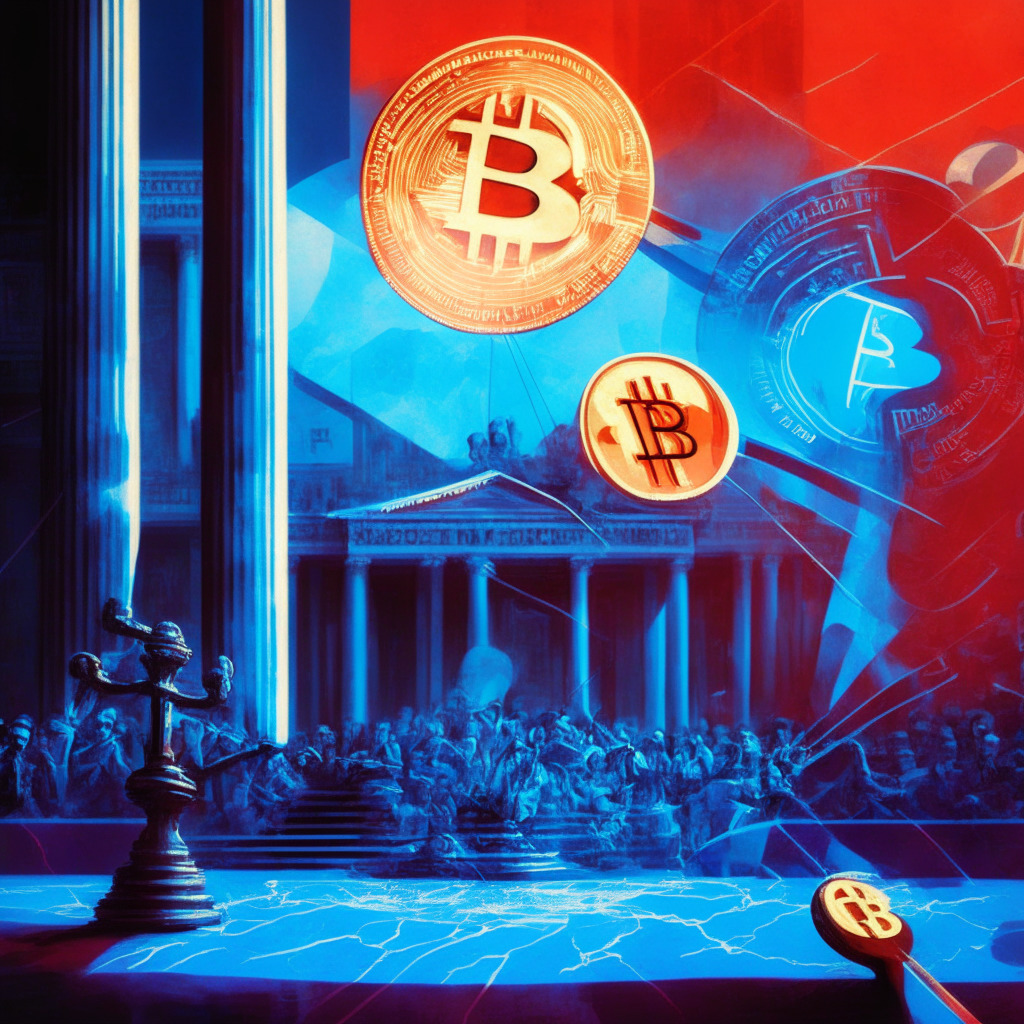HSBC, the global financial powerhouse, is reportedly partnering with crypto custody technology firm, Fireblocks, known for its safekeeping tech like multi-party computation (MPC). Despite regulatory ambiguity around digital assets, HSBC showcases a progressive crypto approach, allowing customers to trade digital currencies like Bitcoin and Ethereum through exchange-traded funds or ETFs.
Search Results for: HSBC
HSBC Hong Kong Opens Bitcoin & Ethereum Futures ETFs: A Step Towards Crypto Accessibility
HSBC Hong Kong now offers customers the ability to trade Bitcoin and Ethereum futures Exchange Traded Funds (ETFs), expanding access to digital asset derivatives in the Asia crypto hub. The ETFs include CSOP Bitcoin Futures ETF, CSOP Ethereum Futures ETF, and Samsung Bitcoin Futures Active ETF.
HSBC Hong Kong Embraces Crypto ETFs: Excitement vs Reality in the Blockchain World
HSBC Hong Kong’s recent addition of access to Bitcoin and Ether exchange-traded funds (ETFs) highlights the growing interest in cryptocurrency investments among larger institutions. However, investors should be cautious not to overreact, as the adoption of crypto investments by mainstream institutions may happen gradually and the technology is still evolving.
HSBC Hong Kong Launches Crypto Services: Analyzing Benefits, Risks, and Industry Impact
HSBC Hong Kong is launching its first local cryptocurrency services, offering Bitcoin and Ethereum-based exchange-traded funds (ETFs). In tandem, the bank is also introducing the Virtual Asset Investor Education Center to educate investors and mitigate potential risks associated with cryptocurrencies.
HSBC’s Bold Move: Offering Crypto ETFs and Balancing Regulatory Pressure in Hong Kong
HSBC becomes the first bank in Hong Kong to enable customers to buy and sell Bitcoin ETFs, marking a significant milestone in local cryptocurrency exposure. The bank also launched the Virtual Asset Investor Education Centre to support this development and promote responsible investing.
HSBC Enters Metaverse: Booming NFTs Attract Banks and Celebrities – Pros and Cons Explored
As NFTs gain traction, major players file patents and explore platforms, including HSBC’s venture into metaverse banking and Queen Productions’ plan to offer NFT-authenticated media. The growing interest and adaptation to emerging NFT and metaverse technologies signal an interconnected world, but challenges and skepticism remain.
HSBC Recognizes Ripple’s XRP Ledger: Game Changer or Regulatory Minefield?
HSBC, one of the world’s largest banks, highlights Ripple’s XRP Ledger as a game changer in the financial sector for real-time cross-border settlements. Despite ongoing legal challenges with the U.S. Securities and Exchange Commission, Ripple’s global expansion and strong YTD increase suggest potential success but warrant caution in navigating regulatory issues and broader concerns.
Harnessing Digital Yuan and Hong Kong’s FPS: A Leap Towards International Financial Synchronization or Concern for Economic Autonomy?
The digital currency research division of People’s Bank of China (PBoC) has interlinked its CBDC platform with Hong Kong’s Fast Payment System (FPS), to expedite cross-border digital yuan transactions and enhance system compatibility with international payment networks. However, this convergence of global currency networks may risk homogenizing diverse economic systems.
Chase UK Targets Crypto Transactions: Banking Hurdles & Community Reaction
Starting October 16, Chase, a digital bank owned by JPMorgan, will decline transactions related to crypto assets, citing rising instances of fraud. This decision aligns with several other UK banks that have recently narrowed the scope of operations with cryptocurrencies.
Insured Cryptocurrency Staking: A Game-changer or A Potential Risk?
“Boerse Stuttgart Digital, an arm of Stuttgart Stock Exchange, plans to launch an insured cryptocurrency staking service, addressing risk mitigation for potential investors. This development symbolizes the merging of traditional financial services and digital assets, potentially leading to a future where both integrate seamlessly.”
The Impending Revolution of Asset Tokenization: Promises and Challenges
“Tokenization of assets, estimated to reach a value of $16 trillion by 2030, offers immense potential in democratizing finance. It allows for fractionalized investments, expanding opportunities to the general population. However, integration of blockchain without disrupting existing services poses a significant challenge.”
Financial Incentives for Eco-Friendly Behavior: Chinese Bank Rewards Recycling with Digital Yuan
In a pioneering move, the Qingdao Branch of the Bank of Communications in China has launched a rewards program that offers digital yuan for recycling. Partnering with Jiaoyun Beijie, the city’s household waste disposal provider, residents can earn digital currency deposited directly into their digital yuan wallets in return for recycling. This novel approach promotes environment-friendly behavior and integration into the digital economy.
Navigating Rough Waters: Binance’s New Compliance Leadership Amid Regulatory Challenges
“Binance announced that Kristen Hecht assumed the role of Deputy Chief Compliance Officer amidst potential fraud charges. Her responsibilities include strengthening compliance provisions, combating financial crime risks and overseeing anti-money laundering teams. This occurs as Binance navigates through regulatory scrutiny in the US and Europe.”
Navigating the Swiftly Changing Cryptographic Asset and Blockchain Landscape: Successes, Setbacks, and Security Issues
“The cryptographic asset and blockchain industry continually evolves. Recent developments include banking issues for Hong Kong crypto businesses, digital criminality, varied progress for Binance in Dubai and Nigeria, operational updates at Kraken, central bank digital currency tests in Korea, and a new partnership for Sorare. These highlight the rapid advancement and regulatory challenges in blockchain technology.”
Navigating the Maze: The Trials and Triumphs of Establishing Hong Kong as a Crypto Hub
“Hong Kong is working towards becoming a crypto hub, but faces challenges such as difficulties for crypto companies in opening corporate bank accounts. Despite the slow pace of local regulatory organizations, efforts are being made to ease these obstacles with initiatives like Hong Kong Monetary Authority urging significant lenders to accept crypto exchanges as clients.”
Prospects and Pitfalls of a Regulated Liability Network in Revolutionizing Wholesale Payments
Financial giants Citigroup, HSBC, and BNY Mellon are experimenting with a “regulated liability network” for negotiating wholesale payments via shared ledgers, which may revolutionize the handling of payments. However, questions regarding security, implications for CBDCs and private stablecoins, and the potential for increased digital bureaucracy persist. This suggests a need for careful investigation and a balanced perspective on the potential risks.
Hong Kong’s Virtual Asset Index: Boon for Crypto Adoption or Gateway to Volatility?
Hong Kong rating agency HKVAC announced its virtual asset index, including Bitcoin, Ethereum, and the largest 30 cryptos. This follows HSBC’s support for trading BTC and ETH futures ETFs, potentially driving mainstream adoption, yet also raising concerns about volatility, risk, and regulatory scrutiny.
Bitcoin Bulls vs $30,000 Support: Analyzing Traders’ Positions Amid Crypto Gains and Regulations
Bitcoin bulls have leveraged long positions using margin and futures markets, backed by positive momentum from spot Bitcoin ETF requests, heavy institutional inflow, and improved U.S. regulatory perspectives. This support helps sustain the $30,000 BTC price level in the coming weeks.
Hong Kong’s Rising Crypto Hub Status: Impact on US Firms and Asian Markets
Hong Kong is increasingly attracting cryptocurrency firms like Circle due to its focus on becoming a center for digital assets markets and stablecoins amid US regulatory crackdowns. Investors must conduct thorough research and stay informed about regulatory updates to make safer financial choices in this evolving landscape.
Exploring Project Guardian: Tokenized Digital Assets and the Future of Finance
The Monetary Authority of Singapore, Bank for International Settlements, and major financial institutions collaborate on Project Guardian, which explores designing open and interoperable networks for tokenized digital assets across asset classes like wealth management, fixed income, and foreign exchange. This project raises questions on accessibility, scalability, and regulatory adaptation.
Hong Kong’s Web3 Regulation: Balancing Innovation and Investor Protection
Hong Kong embraces Web3 regulation by incorporating virtual asset providers into the regulatory system, fostering innovation and strengthening market trust. New rules enforce Anti-Money Laundering guidelines and investor protection laws while permitting retail investors to trade virtual assets.
Google Cloud’s AMLAI: Game Changer for Fintech or Privacy Nightmare? Pros, Cons & Conflicts
Google Cloud’s Anti Money Laundering AI (AMLAI) service, recently tested with HSBC, introduces machine learning for efficient money laundering detection at scale. Despite success, concerns about data security, privacy, and job displacement prompt cautious adoption of AI in the financial sector.
TradFi Execs Jump Ship to Crypto: Banking on Innovation & Future Adoption
Former traditional finance executives who transitioned to crypto remain bullish about the industry’s future, finding greater freedom for innovation in the crypto space. Comparing crypto adoption to ESG criteria, they predict the technology will go mainstream within a decade.
Alibaba’s New Chairman Sparks Crypto Dreams: Is China Ready to Embrace Web3?
Alibaba appoints crypto-friendly Joseph Tsai as new Chairman amidst restructuring, sparking interest in the crypto community. Tsai is an advocate of cryptocurrencies and digital assets, prompting speculation of Alibaba embracing Web3 and crypto in China. Hong Kong’s recent regulatory framework for crypto shows growing interest in digital assets.
SEC vs Binance.US Showdown: Unearthing Past Statements and Facing New Legislation
The U.S. SEC’s intention to freeze Binance.US’s assets faced a setback as Judge Amy Berman Jackson advised bilateral negotiations. Meanwhile, HKMA urges banks to accept crypto exchanges as clients, and the European Parliament passes the EU Artificial Intelligence Act, impacting governance of AI technologies.
Crypto Market Bullishness Shifts to Asia Amid US Regulatory Pressure and Hong Kong Hesitation
Despite market fluctuations and mounting regulatory pressure, the bullishness remains in the crypto market, driven by developments overseas, particularly in Asia and the Middle East. However, Hong Kong banks’ reluctance to onboard crypto clients poses a significant barrier to fostering growth and expansion in the crypto market.
Hong Kong’s Crypto Ambitions: Banks Grapple with Regulation and Partnership Prospects
The Hong Kong Monetary Authority (HKMA) is encouraging major banks to engage with cryptocurrency clients, following Hong Kong’s efforts to become a significant global center for the crypto industry. However, potential prosecutions related to illicit financial activities may make banks hesitant to work with crypto exchanges.
Hong Kong’s Race to Rival Singapore: Embracing Crypto and Fintech Innovation vs. US Regulatory Crackdown
Hong Kong aims to become a leading crypto hub, rivaling Singapore, by encouraging major banks to embrace cryptocurrency exchanges as clients. The city has introduced a clear regulatory framework to promote innovation, attracting numerous crypto players to establish operations in the region.
Hong Kong Central Bank Pushes for Crypto Adoption: Pros, Cons, and Conflicts in the Financial World
The Hong Kong Monetary Authority (HKMA) is pressuring major banks like HSBC and Standard Chartered to accept crypto exchanges as clients, highlighting growing cryptocurrency acceptance and the need for traditional financial institutions to adapt to this evolving landscape.
Hong Kong’s Crypto Hub Dreams: Major Banks’ Reluctance vs HKMA Pressure
Hong Kong aims to become Asia’s crypto hub, but major banks like Standard Chartered and HSBC hesitate due to money laundering fears. The Hong Kong Monetary Authority is pressuring banks to onboard crypto exchanges, while banks struggle to balance supporting clients and avoiding potential risks.
US CPI Inflation Data and Fed’s Decision: Bullish Future for Crypto and Stock Markets?
Wall Street estimates suggest a bullish outlook for crypto and stock markets amid cooling US CPI inflation and the Federal Reserve’s anticipated interest rate decision. This could lead to a rebound for top cryptocurrencies like Bitcoin and Ethereum, following the recent market crash.
Ripple vs SEC: A Turning Point or Just Another Crypto Battle? Pros, Cons & Main Conflict
The Ripple Vs SEC lawsuit’s outcome may not set a legal precedent for crypto regulation in the U.S., as the SEC could interpret Ripple’s victory as a one-off case. This highlights complexities in regulating cryptocurrencies and emphasizes the need for comprehensive legislation in the rapidly evolving market.































